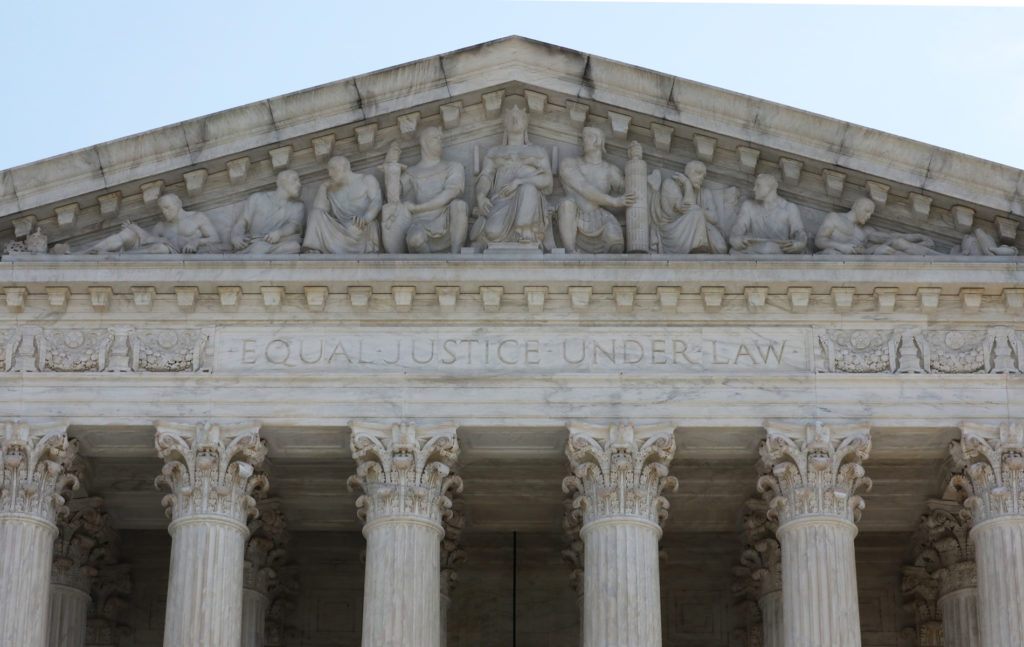
NASHVILLE (BP) – The COVID-19 pandemic provided challenges to the religious liberty of Americans and their churches, but court rulings during the crisis actually affirmed the First Amendment’s protection of the free exercise of religion.
Beginning in March 2020, most Southern Baptist churches and other religious bodies throughout the United States canceled in-person worship gatherings in cooperation with public officials to help prevent the spread of the virus. Some state and local governments adopted reopening restrictions, however, that treated churches and other religious groups less favorably than secular organizations such as businesses.
The Southern Baptist Ethics & Religious Liberty Commission (ERLC) and other religious freedom advocates objected to the disparate treatment, and, ultimately, the US Supreme Court and lower courts issued opinions rejecting the unequal policies.
In hindsight, events during the pandemic underscored the right of churches and other religious groups to gather and to minister without discrimination by the government, defenders of religious liberty said.
“As we reflect on the COVID pandemic and what a difficult season that was for many of our churches and pastors who sought to love their neighbors, both physically and spiritually, we are reminded of the embodied nature of our faith and the vital role that churches play in our communities,” said Jason Thacker, director of the ERLC’s Research Institute.
“More than anything in our lifetimes, that trying time reminded us that churches must never forsake gathering together or working to fulfill their mission,” he said. “At the same time, we also learned new lessons about the importance of pastors and churches working alongside civic leaders for the health of their communities.”
Thacker said the pandemic also “reinforced the fact that governments must always respect religious freedom and protect our rights to assembly, free expression, and religious liberty guaranteed by the First Amendment. Ultimately, for many Christians, the pandemic strengthened our resolve to reach our communities with the good news of Jesus Christ and to seek the good of our neighbors and communities.”
Becket President Mark Rienzi said in an email interview, “The courts got the church closure cases right. It was wrong for governments to treat churches and synagogues as unimportant, while malls, casinos, and liquor stores were allowed to open. The courts eventually got those cases right, and the First Amendment did its job.”
Becket is a leading defender of religious liberty for all people.
Those COVID-era opinions should prove helpful in the future, Rienzi said.
“The court rulings over COVID restrictions on religion made clear that government officials cannot use an emergency as an excuse to discriminate against religious people and religious institutions,” he said. “Those rulings should stand as reminders to state and local governments that they must respect our constitutional rights, even in an emergency.”
The Supreme Court’s November 2020 ruling regarding New York’s pandemic restrictions on religious gatherings proved pivotal. The high court blocked enforcement of then-Gov. Andrew Cuomo’s limitations, finding they “single[d] out houses of worship for especially harsh treatment.” The justices applied that opinion in December 2020 orders involving restrictions in California, Colorado, and New Jersey.
The ERLC filed a friend-of-the-court brief with the Supreme Court in support of an emergency application by Orthodox Jews challenging the restrictions. In the brief, the commission said Cuomo’s order “imposes a substantial and disparate burden” on religious free exercise and “falls far short” of the high court’s previous decisions.
While not all court decisions supported religious freedom, especially early in the pandemic, here are some other significant legal victories for churches and other religious groups:
• The Ninth Circuit Court of Appeals in San Francisco cited the Supreme Court’s New York order in a unanimous opinion in December 2020 that stopped enforcement of Nevada’s pandemic limitations it said treated such entities as casinos, bowling alleys, retail stores, and restaurants “significantly better” than worship gatherings, which were limited to 50 people. Before the decision, the ERLC filed a friend-of-the-court brief with the Supreme Court seeking an expedited ruling for Calvary Chapel Dayton Valley, the church that challenged the restrictions.
• In February 2021, the Supreme Court halted California’s ban on indoor worship services in most of the state. The high court invalidated in a 6-3 decision the state’s prohibition of indoor worship in Tier 1, the category for the highest risk of COVID-19’s transmission, and substituted a limit of 25 percent capacity. Most of California was classified as Tier 1, resulting in a nearly statewide ban on indoor corporate worship.
• A federal court ruled in October 2020 the District of Columbia could not prohibit Capitol Hill Baptist Church, a Southern Baptist congregation, from meeting outdoors during the pandemic with proper safety measures in place. Federal Judge Trevor McFadden said the district’s limitations “substantially burden[ed]” the church’s free exercise of religion and likely violated the Religious Freedom Restoration Act. The district agreed later to pay $220,000 in a settlement with the church.
Though various states and localities imposed discriminatory policies regarding religious gatherings, early in the pandemic the federal government recommended public officials take the First Amendment right of religious liberty into account when they institute reopening policies. The Centers for Disease Control and Prevention issued interim guidelines in May 2020 that said no church or other religious group should be called on to enact “mitigation strategies” stricter than those requested of “similarly situated entities or activities.”
During the pandemic, the ERLC said it recognizes God has given government the authority to enact broadly applied limits on public gatherings during a national health crisis. But in addition to its public comments, the commission said it also repeatedly advocated with the 50 governors’ offices and city halls around the country for churches to be treated the same as similar businesses, spaces and activities.
The overwhelming majority of churches and other religious bodies abided by government policies during the pandemic, which resulted early on in such alternatives as online and drive-in services instead of in-person, corporate worship.
















